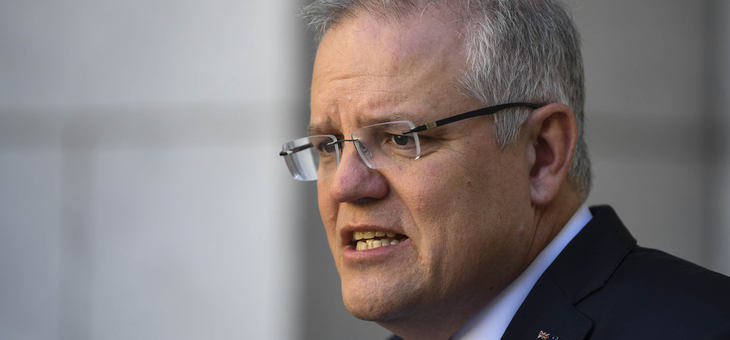Prime Minister Scott Morrison, under fire for Australia’s vaccine rollout debacle, is now being cautioned against pressuring the country’s independent expert immunisation panel, the Australian Technical Advisory Group on Immunisation (ATAGI), to alter its advice on AstraZeneca.
ATAGI recommends that AstraZeneca be given only to people aged 60-plus due to a risk of rare but serious blood clots that reduce with age.
It had initially advised that AstraZeneca be given to anyone aged 16 to 50, but revised that due to an observed higher risk and severity of blood clots in the 50-59 year age group.
However, in June, Mr Morrison said that people aged under 40 should speak to their doctor about receiving AstraZeneca, and in Canberra on Wednesday he blamed ATAGI’s age limit advice for causing a “big problem” with the national vaccine uptake.
He said he had been making a “constant appeal” to ATAGI for changed recommendations, arguing that the risk profile had changed, so the advice should too.
“It’s for them [ATAGI] to now constantly reconsider how that balance of risk applies, and provide their advice accordingly,” he told journalists. “The situation Australia faces should be managed on the balance of risk as ATAGI has said to me in the past.”
Mr Morrison said Australia was about two months behind the planned vaccination program “as a result of the ATAGI advice on AstraZeneca”.
Read: Most older Aussies need to be vaccinated before nation reopens
The criticism has not gone down well in several quarters.
Australian Medical Association vice-president Chris Moy said ATAGI’s independence was critical and it should “not be attacked at all”.
“These are good people who give up their time to provide good advice,” he told ABC TV on Wednesday afternoon.
“The job of the government is to appoint these people. Get them to give the advice in a cold, hard fashion and go with it given the circumstances.”
Dr Moy did support the AstraZeneca jab, saying it was “a really good vaccine”, and that ATAGI’s recommendation was “conservative”.
“You have to look at the detail of what ATAGI has said, which has been good advice and it’s recommended in a non-COVID situation to have Pfizer under 60,” he said.
“We’re in a different situation and governments need to step up and say this is our independent advice but we call the shots on this.”
Read: Vaccinated people contracting COVID no cause for alarm, say experts
Senior Labor frontbencher Tony Burke said that independent institutions were critical to public confidence in vaccines. “We undermine the independence of ATAGI at our peril,” he told Sky News.
Supplies of the preferred Pfizer vaccine have begun arriving in Australia, with one million per week due to hit our shores. And with three states in lockdown because of the highly contagious Delta strain, vaccination hesitancy has largely evaporated. Access is the issue for many.
The Victorian Department of Health has sought to clarify reports that Pfizer jabs are being binned because of no-shows at appointments.
Channel Nine reported on Monday that 20 per cent of bookings failed to show up to a Victorian vaccination hub, but a health department spokesperson said the doses were not wasted.
“A missed appointment does not mean vaccine is wasted, as vaccine is only drawn up as needed. In the limited circumstances where there is excess vaccine, health services work to locate other people who can receive it,” the spokesperson said.
Read: Vaccine advice changes again as young accused of ‘gaming’ the system
However, no-shows are not the only reason for wastage reports, as storage issues are also a problem.
Dr Moy says that, theoretically, each vial of Pfizer vaccine (0.45ml) contains enough for six doses when it is diluted with 0.3ml of saline.
However, depending on the size of the syringe, it is not always possible to extract the sixth dose, he told The New Daily.
That means a doctor may need to open four vials instead of three, if he or she has 18 vaccination bookings that day.
“If somebody doesn’t turn up, you could end up with a whole vial (left over),” Dr Moy said.
Once a vial is opened and diluted, the vaccine lasts only for up to six hours.
“Now, the problem is you might end up with theoretical wastage, so you either throw it in the bin or give it to somebody else,” Dr Moy said.
There are also reports of young Sydneysiders ‘gaming’ the system and accessing Pfizer shots despite not being eligible. They are reportedly sharing a legitimate link on the NSW Health website, via social media, to book Pfizer vaccinations, despite not meeting the eligibility criteria.
By this morning, 11.66 per cent of Australians were fully vaccinated and 29.1 per cent had received one shot.
Have you sought advice about having a second AstraZeneca jab earlier than the recommended 12 weeks? Share your experiences in the comments section below.
If you enjoy our content, don’t keep it to yourself. Share our free eNews with your friends and encourage them to sign up.

